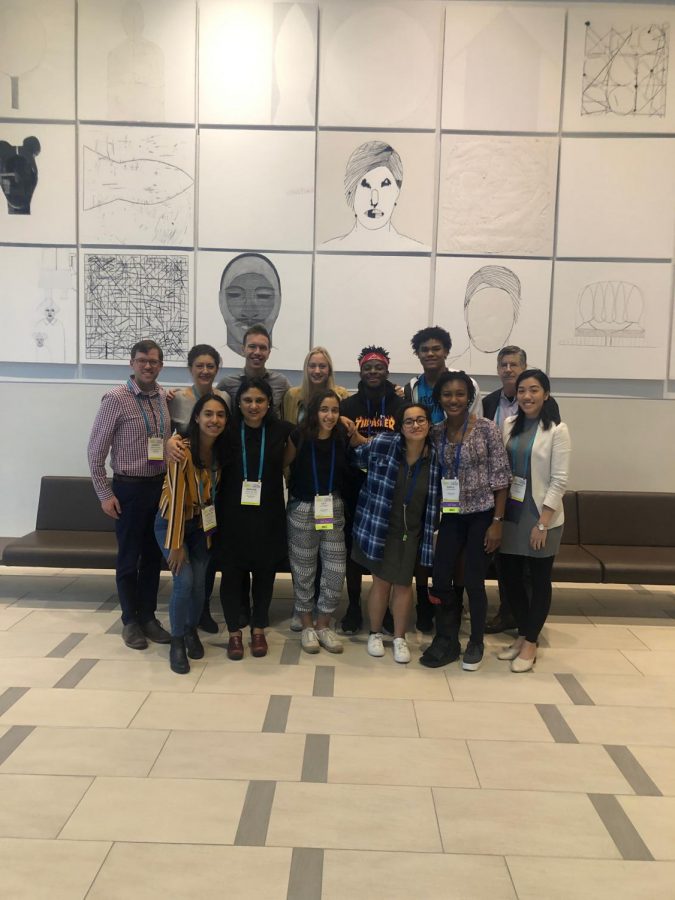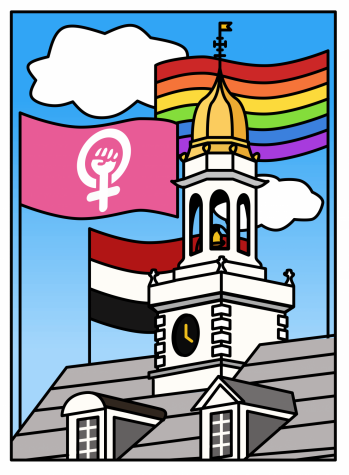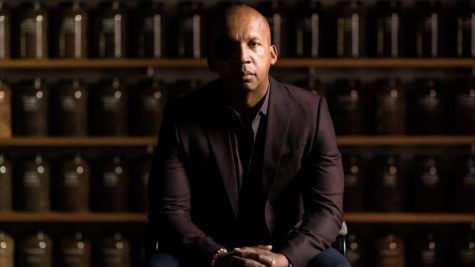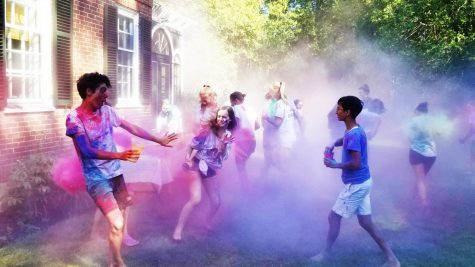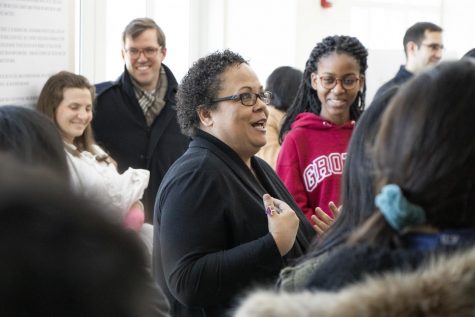Groton students and faculty at SDLC and PoCC.
Groton students and faculty at SDLC and PoCC.
Every year, the National Association of Independent Schools (NAIS) holds a Student Diversity Leadership Conference (SDLC) and People of Color Conference (PoCC) concurrently. The former is for students ranging from ninth to twelfth grades and focuses on “self-reflecting, forming allies and building community,” according to the NAIS website. The latter is designed for educators of all levels: administrators, teachers, trustees, etc. focus on “equity and justice in teaching, learning, and organizational development.” Groton has attended both conferences for several years now, led twice by Director of Inclusion Outreach and Assistant Director of Admission Carolyn Chica.
This year, Ms. Chica selected six students to travel to Nashville, Tennessee to take part in the 25th annual SDLC: PK Baffour-Awuah ’20, Caleb Coleman ’20, Lily Cratsley ’19, Eliza Lord ’19, Karla Sanford ’19, and Dashy Rodriguez ’19. They were chosen based on survey responses elicited last spring, and Ms. Chica added that it was a “hard choice.” As Cultural Alliance faculty advisors, Ms. Chica and English teacher Jake Kohn chaperoned the trip and also attended the 31st annual PoCC with Spanish teacher Andy Anderson, art teacher Jennifer Ho, college counselor Robert O’Rourke, English teacher Sravani Sen-Das, and French teacher Rebecca Stanton. The conferences ran from Thursday, November 29 to Saturday, December 1. Their overarching themes change each year. This year, attendees were asked to relate their thoughts and conclusions to music: PoCC’s theme was “Equitable Schools and Inclusive Communities: Harmony Discord, & The Notes in Between” and SDLC’s was “Listening for The Grace Note: Finding Harmony Amid Cacophony.”
SDLC had three keynote speakers: Lisa Ling, a journalist, author and television presenter; Christian Picciolini, an author, musician, co-founder of the nonprofit Life after Hate and an integral member in the late 1980s of the Skinheads, a white supremacist group; and Marc Lamont Hill, an author, activist, and academic who had been fired from CNN for his controversial comments on the Israeli-Palestine conflict two days before he spoke. Ms. Ling was the opening ceremony keynote speaker, Mr. Picciolini was the speaker for the second day, and Dr. Hill was the keynote speaker for the closing ceremony. Mr. Picciolini was the SDLC-specific speaker while Ms. Ling and Dr. Hill spoke to PoCC and SDLC jointly.
These speakers were insightful additions to the daily programming, where students spent most of their time in workshops led by SDLC faculty that taught skills for engaging in meaningful social justice work and fostered a comfortable environment for vulnerable reflections on identity. Just under 1,700 students were placed into randomly generated “family” and “home” groups which numbered between 50 and 60 students and 7 and 9 students respectively. Eliza described these groups as her favorite aspect of SDLC: “Everyone was just completely honest in the home groups about who they were, what they thought, what their beliefs were because there were no ulterior motives…because we would just be there for 48 hours.” Students also gathered for two sessions in their respective race or sexual orientation affinity groups to discuss their shared experiences. Karla said the LGBTQ affinity group was her favorite part of the conference. “I was really thankful that in the space of the affinity group they separated students of color and white students,” she said, “I could tell that my intersectionality was appreciated and valued.”
PoCC, the faculty portion of the event, differed greatly from SDLC in its style of programming but also explored the ideas of identity and race in educational institutions. Ms. Chica explained, “The PoCC is a conference centered around and geared for people of color in Independent Schools throughout the country. The main discussion is focused on race and all the other identifiers that intersect with it.” The adults choose between hundreds of workshops and saw both their own keynote speakers and some that the students saw. Ms. Chica described SDLC as “a conference built to celebrate the differences among our youth.” SDLC, with a packed daily schedule from 8 AM to 11 PM, is far more structured than PoCC. Rather than each student choosing different workshops, all student follow a very similar curriculum within their family groups.
Ms. Chica explained that the conferences are something she looks forward to every year. She discussed her belief that it is critical for our schools’ faculty members to experience this type of conference and to think about how much their words and actions in the classroom and beyond can influence those around them.
Ms. Sen-Das also commented on how she was particularly impressed by the growth of PoCC, both in its numbers and the strength of the workshops throughout her years attending. She explained that one of her favorite parts of the experience is seeing faculty from previous conferences and catching up about how they are influencing their schools and communities. Her goals for the Groton community include using the knowledge and experience gained in Nashville to better our Diversity and Inclusion (D&I) leaders. In order to do this, the six students who attended SDLC and the seven faculty from PoCC presented separately at a faculty meeting to enhance understanding of core cultural identifiers and how they intersect on campus. The students also led a workshop for the D&I group and will be helping plan activities for MLK Day inspired by their time at SDLC.
The six student attendees all feel empowered to make change in the community and promise not to stop until every voice feels heard, valued, and loved. They would also like to give a special thank you to Ms. Chica and her consistent efforts for supporting Groton’s involvement with SDLC. Her hard work preparing for the conference and all the accompanying logistics did not go unnoticed, and the students greatly appreciate her and all she did to make this experience possible. They’d also like to thank Ms. Sen-Das for making the students feel very prepared to engage in SDLC workshops through her comprehensive training with Diversity and Inclusion.


